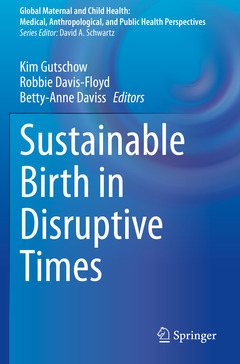Description
Sustainable Birth in Disruptive Times, 1st ed. 2021
Global Maternal and Child Health Series
Coordinators: Gutschow Kim, Davis-Floyd Robbie, Daviss Betty-Anne
Language: English
Subjects for Sustainable Birth in Disruptive Times:
Keywords
sustainability and birth models; maternal and neonatal health; saving newborn lives; reproductive justice; ending preventable maternal mortality; obstetric violence; midwifery and obstetric models of care; evidence-based activism in maternity care; continuum of care; quality; equity; and dignnity of maternity care; sustainable models of breech care; sustainable maternal health metrics; sustainable surrogacy practices; physiologic childbirth; maternity hospital; medicalized childbirth; sustainable newborn care; home birth; sustainable abortion; maternal quality of care
Publication date: 03-2022
317 p. · 15.5x23.5 cm · Paperback
Publication date: 03-2021
317 p. · 15.5x23.5 cm · Hardback
Description
/li>Contents
/li>Biography
/li>Comment
/li>
- Sustainable collaborations including transfers of care among midwives and obstetricians in India, The Netherlands, Germany, United Kingdom, and Denmark
- Midwifery-oriented, femifocal, indigenous, and inclusive models of care that counter obstetric violence and gender stereotypes in Mexico, Chile, Guatemala, Argentina, and India
- Doula care and midwifery care for women of color, previously incarcerated women, indigenous women, and other minoritized groups in the global north and south
- Practices and metrics for improving quality of newborn and maternal care as well as maternal and newborn outcomes in disruptive times and disaster settings
Sustainable Birth in Disruptive Times is an essential and timely resource for providers, policy makers, students, and activists with interests in maternity care, midwifery, medical anthropology, maternal health, newborn health, obstetrics, childbirth, medicine, and global health in disruptive times.
Chapter 1. Introduction: Sustainable Birth in Disruptive Times.- Chapter 2. Sustainable Midwifery.- Chapter 3. Bringing Back Breech by Reframing the Language of Risk.- Chapter 4. From Home to Hospital: Sustainable Transfers of Care in the United States.- Chapter 5. Structures for Sustainable Collaboration Between Midwives and Obstetricians in the Netherlands: The Obstetrics and Midwifery Manual and Perinatal Care Partnerships.- Chapter 6. Re/Envisioning Birth Work: Community-Based Doula Training for Low-Income and Previously Incarcerated Women in the United States.- Chapter 7. Sustainable Metrics: Using Measurement-Based Quality Improvement to Improve Maternity Practice While Avoiding Frustration and Pitfalls.- Chapter 8. Unsustainable Surrogacy Practices: What We Can Learn from a Comparative Assessment.- Chapter 9. Childbirth in Chile: Winds of Change.- Chapter 10. Humanizing Care at the Maternity Hospital Estela de Carlotto in Buenos Aires: Providers Relearning Their Roles.-Chapter 11. Luna Maya Birth Centers in Mexico: A Network for Femifocal Care.- Chapter 12. Reconstructing Referrals: Overcoming Barriers to Quality Obstetric Care for Maya Women in Guatemala Through Care Navigation.- Chapter 13. A Sustainable Model of Assessing Maternal Health Needs and Improving Quality of Care During and After Pregnancy.- Chapter 14. Sustainable Maternal and Newborn Care in India: A Case Study from Ladakh.- Chapter 15. Giving Birth at Home in Resource-Scarce Regions of India: An Argument for Making the Women-Centric Approach of the Traditional Dais Sustainable.- Chapter 16. It Takes More than a Village: Building a Network of Safety in Nepal’s Mountain Communities.- Chapter 17. Tranquil Birth: Revising Risk to Sustain Spontaneous Vaginal.- Chapter 18. Sustainable Birth Care in Disaster Zones and During Pandemics: Low-Tech, Skilled Touch.- Ch 19. Sustainable Newborn Care: Helping Babies Breathe and Essential Newborn.- Chapter 20. Conclusion: Sustainable Maternity Care in Disruptive.




